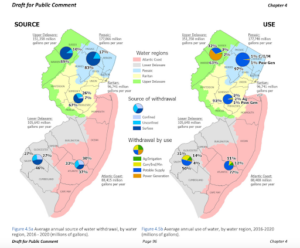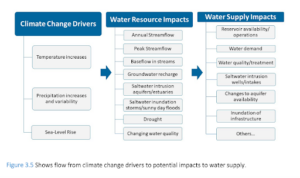Can New Jerseyans count on enough water supply for the foreseeable future?
Water is a vital element for the survival of human beings, and its availability plays a crucial role in our existence. However, ensuring a reliable and adequate supply of clean water is challenging and requires careful management, strategic planning, and innovative solutions. It is critical to have enough water of acceptable quality to meet our present and future needs. This is why statewide water supply planning is incredibly essential.
A statewide water supply plan cannot just be a mere document of information. Without proper dissemination and dissection of the plan, municipal and utility leaders may miss the opportunity to use the information to make informed decisions, plan ahead, or act appropriately in case of a crisis. Therefore, we invite you to take a moment to explore the fascinating world of statewide planning via the latest New Jersey Department of Environmental Protection Statewide Water Supply Plan. Grab a glass of water and learn more about this important plan.
The plan offers a high-level overview of the water supply for the entire state. Below are a few choice quotes from NJDEP on the Water Supply Plan:
- New Jersey’s water resources are essential public assets, held in trust for the people by the State Commissioner of Environmental Protection, and critical to the health, safety, economic well being, recreational and aesthetic enjoyment, and general welfare of all New Jersey residents.
- The State’s 9.3 million residents, $800 billion economy, and diverse ecosystems depend upon a clean, secure, and resilient water supply to meet daily needs, expand economic opportunities, enhance living standards, improve public health, and restore the natural environment.
- Thus, the New Jersey Legislature, through the Water Supply Management Act (N.J.S.A. 58:1A et. seq), charged the Commissioner and our Department of Environmental Protection (DEP) with ensuring that water resources are planned for and managed as a common resource to provide an adequate supply and quality of water for present and future generations of New Jerseyans and to protect the natural environment of the state’s waterways.
- The 2024 Plan concludes that, under normal conditions and in most regions, the State has sufficient quantities of water to meet current and reasonably anticipated future needs. However, the continued availability of water resources and their readiness for use are dependent upon intentional and consistent actions to conserve, bolster, and actively manage public and private water supplies.

Three important updates the plan considers:
- The report tries to capture as much information as possible on the climate crisis. “We got good data,” says Jennifer Coffey, Association of New Jersey Environmental Commissions (ANJEC) Executive Director. “We will start seeing storms get bigger (precipitation) and a whole lot of rain, big storms in the coast, and the flip side of that is that we’ll probably be looking at a longer period of dryness.”
- For the first time, the report articulates justice and equity issues. Not everyone benefits from the same investments, and we can see that Black, Brown, Indigenous, and people whose English is a second language are not benefiting as much from investments.
- The report also looks at not just water supply, do we have enough, but also at water quality. The report highlights information on how things like the harmful algal blooms (page 77) and forever chemicals affect our water. The plan must be a living document as changes occur. For example, the Environmental Protection Agency announced on April 10 new National Primary Drinking Water Regulation (NPDWR) for six PFAS to protect communities, which probably means that the supply plan may need to be updated in this area.
Municipal leaders should develop greater awareness of the current status of their water supply and fully understand their responsibility when it comes to water issues. Jennifer Coffey says, “Managing water can’t be based on municipal boundaries. It must be managed regionally. They should prepare for periods of dryness and be ready with communication resources when a drinking water drought hits. They should think about how to communicate when there is a crisis.” She suggests that municipal leaders should familiarize themselves with the information on https://dep.nj.gov/drought/. That website has information on various water supply conditions within the state based on the different Water Supply Regions. There is a normal (green), watch (yellow), warning (orange), and emergency (red) rating system that provides information relevant to share with the community if there is a problem. Here, the important piece is to be ready and think about how they will communicate should a crisis occur, before a crisis occurs. Create a sort of “phone tree” to ensure their network has pertinent information on time.
While this is helpful, at the municipal level, decision makers must ask themselves if they have the infrastructure for their current situation and consider that information for any reasonable growth. Don Shields, from NJ American Water, says, “decision makers must consider what is available in terms of water supply, what are their projected demands, and whether they have the assets to support those needs.”
Jersey Water Works collaborative action agenda called for the maintenance of water systems and infrastructure assets for efficient and effective reduction of leakage, emergency repairs, and other impacts. The supply plan highlights the importance of Asset Management and Resilience. It states that “maintenance and improvement of infrastructure is key to effective and successful water supply management, and critical to ensure the State has access to clean and plentiful drinking water. Proper asset management can reduce water incidents and emergencies, limit disruptions to customers, and reduce long-term costs.”
Go ahead, dive in, and see the connections between what’s on the plan and what we care about as the Jersey Water Works collaborative.
Website: https://dep.nj.gov/water-supply-plan/
- Cover page
- Executive Summary
- Chapter 1: Introduction
- Chapter 2: Statewide Water Availability
- Chapter 3: Climate Change
- Chapter 4: Statewide Demands and Balances
- Chapter 5: Water Resource Protection and Planning
- Chapter 6: Regional Planning for Deficit Mitigation
- Chapter 7: Managing Uncertainty: Drought, Resilience and Sustainability
- Chapter 8: Recommendations and Action Items
- Glossary
- References

The Water Supply Advisory Council (WSAC) meets regularly to review the plan. Individuals who want to learn more can find information here. Please remember that NJDEP seeks input on the Draft 2024 New Jersey Statewide Water Supply Plan. Please provide written feedback here by April 26, 2024.